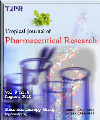
|
Tropical Journal of Pharmaceutical Research
Pharmacotherapy Group, Faculty of Pharmacy, University of Benin, Benin City, Nigeria
ISSN: 1596-5996
EISSN: 1596-5996
Vol. 16, No. 2, 2017, pp. 463-470
|
 Bioline Code: pr17060
Bioline Code: pr17060
Full paper language: English
Document type: Research Article
Document available free of charge
|
|
|
Tropical Journal of Pharmaceutical Research, Vol. 16, No. 2, 2017, pp. 463-470
| en |
Practice of pharmaceutical care in community pharmacies in Jordan
Elayeh, Eman; Akour, Amal; Almadaeen, Saba; AlQhewii, Tahani & Basheti, Iman A
Abstract
Purpose: To describe the current role played by pharmacists in delivering pharmaceutical care (PC) in
community pharmacies in Jordan (current activities and practices undertaken in the community and
extent of provision of PC standards), pharmacists’ perspectives on PC implementation and barriers to
implementing PC practices.
Methods: This cross sectional study was conducted in 2014in Amman, the capital of Jordan and Zarqa,
the second biggest city in Jordan. The study involved a validated questionnaire administered at random
by trained pharmacy students to 180 community pharmacists. The questionnaire was designed to
collect demographic data, pharmacy practice features displayed by the pharmacists, dispensing
activities undertaken, internationally proposed PC practice standards in community pharmacy settings,
inter/intra-professional and public heath activities and barriers that may hinder the implementation of PC
practice in Jordan.
Results: 163 pharmacists agreed to participate in the study (response rate was 90.5 %). Most
dispensing activities (98.1%) in the pharmacies were done under the supervision of pharmacists. All
pharmacists were willing to implement PC, and nearly all of them (98.8 %) provided basic information
about medication use. Nevertheless, only 31.0 % adapted standard procedures for patient’s data
collection, 23.1 % formulated a therapeutic plan to be included within the patient’s permanent record in
their pharmacy, 24.2 % documented over-the-counter recommendations, and 29.7 % allocated time to
discuss patient’s care plans. Identified barriers preventing the provision of PC practice included lack of
training on the concept (44.9 %) and lack of acceptability from the physicians (43.4 %).
Conclusion: Although participating pharmacists showed willingness to implement PC practice, their
actual application to the practice was found to be limited. Lack of adequate pharmaceutical training and
acceptability by the physicians are the major barriers towards the provision of PC practice in the
country.
Keywords
Community pharmacists; Pharmaceutical care; Barriers; Jordan
|
| |
© Copyright 2017 - Pharmacotherapy Group, Faculty of Pharmacy, University of Benin, Benin City, 300001 Nigeria.
Alternative site location: http://www.tjpr.org
|
|
